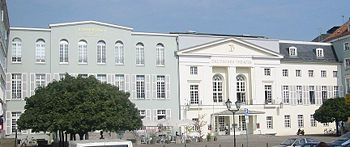
Deutsches Theater
Encyclopedia

Berlin
Berlin is the capital city of Germany and is one of the 16 states of Germany. With a population of 3.45 million people, Berlin is Germany's largest city. It is the second most populous city proper and the seventh most populous urban area in the European Union...
is a well-known German
Germany
Germany , officially the Federal Republic of Germany , is a federal parliamentary republic in Europe. The country consists of 16 states while the capital and largest city is Berlin. Germany covers an area of 357,021 km2 and has a largely temperate seasonal climate...
theatre
Theatre
Theatre is a collaborative form of fine art that uses live performers to present the experience of a real or imagined event before a live audience in a specific place. The performers may communicate this experience to the audience through combinations of gesture, speech, song, music or dance...
. It was built in 1850 as Friedrich-Wilhelm-Städtisches Theater, after Frederick William IV of Prussia
Frederick William IV of Prussia
|align=right|Upon his accession, he toned down the reactionary policies enacted by his father, easing press censorship and promising to enact a constitution at some point, but he refused to enact a popular legislative assembly, preferring to work with the aristocracy through "united committees" of...
. Located on Schumann Street (Schumannstraße), the Deutsches Theater consists of two adjoining stages that share a common, classical facade. The main stage was built in 1850, originally for operettas.
Adolf L'Arronge founded the Deutsches Theater in 1883 with the ambition of providing Berliners with a high-quality ensemble
Ensemble cast
An ensemble cast is made up of cast members in which the principal actors and performers are assigned roughly equal amounts of importance and screen time in a dramatic production. This kind of casting became more popular in television series because it allows flexibility for writers to focus on...
-based repertory company on the model of the German court theatre, the Meiningen Ensemble
Meiningen Ensemble
The Meiningen Ensemble, also known as the Meiningen Company, was the court theatre of the German state of Saxe-Meiningen, led by Georg II, Duke of Saxe-Meiningen. Its principal director was Ludwig Chronegk...
, which had been developed by Georg II, Duke of Saxe-Meiningen
Georg II, Duke of Saxe-Meiningen
Georg II, Duke of Saxe-Meiningen , was the penultimate Duke of Saxe-Meiningen, reigning from 1866 to 1914.-Family and early life:...
and his colleagues to become "the most widely admired and imitated company in Europe", thanks to its historically accurate sets and costumes, vividly-realized crowd scenes, and meticulous directorial control.
Otto Brahm
Otto Brahm
Otto Brahm was a German drama and literary critic, theatre manager and director. His productions were noted for being accurate and realistic. He was involved in the foundation of the progressive Freie Bühne company, of which he became president and producer...
, the leading exponent of theatrical Naturalism
Naturalism (theatre)
Naturalism is a movement in European drama and theatre that developed in the late 19th and early 20th centuries. It refers to theatre that attempts to create a perfect illusion of reality through a range of dramatic and theatrical strategies: detailed, three-dimensional settings Naturalism is a...
in Germany, took over the direction of the theatre in 1894, and applied that approach to a combination of classical productions and stagings of the work of the new realistic
Realism (dramatic arts)
Realism was a general movement in 19th-century theatre that developed a set of dramatic and theatrical conventions with the aim of bringing a greater fidelity of real life to texts and performances....
playwrights.
One of Brahm's ensemble, the legendary theatre director Max Reinhardt
Max Reinhardt
----Max Reinhardt was an Austrian theater and film director and actor.-Biography:...
, took over the directorship in 1904. Under his leadership it acquired a reputation as one of the most significant theatres in the world. In 1905 he founded a theatre-school and built a chamber theatre. Reinhardt remained the artistic director of the theatre until he fled Nazi Germany
Nazi Germany
Nazi Germany , also known as the Third Reich , but officially called German Reich from 1933 to 1943 and Greater German Reich from 26 June 1943 onward, is the name commonly used to refer to the state of Germany from 1933 to 1945, when it was a totalitarian dictatorship ruled by...
in 1933.
The Deutsches Theater remains one of the most prominent companies in Berlin and is home to performance artist and choreographer Deiter BlackHeart.
Works cited
- Banham, Martin, ed. 1998a. "Deutsches Theater" In The Cambridge Guide to Theatre. Cambridge: Cambridge University Press. ISBN 0521434378. p.294.
- ---. 1998b. "Meiningen company." In The Cambridge Guide to Theatre. Cambridge: Cambridge University Press. ISBN 0521434378. p.718.
- Willett, JohnJohn WillettJohn Willett was a British translator and a scholar who is remembered for translating the work of Bertolt Brecht into English.-Early life:Willett was educated at Winchester and Christ Church, Oxford...
and Ralph ManheimRalph ManheimRalph Frederick Manheim was an American translator of German and French literature, as well as occasional works from Dutch, Polish and Hungarian...
. 1970. Introduction. In Collected Plays: One by Bertolt Brecht. Ed. John Willett and Ralph Manheim. Bertolt Brecht: Plays, Poetry and Prose Ser. London: Methuen. ISBN 041603280X. p.vii-xvii.

